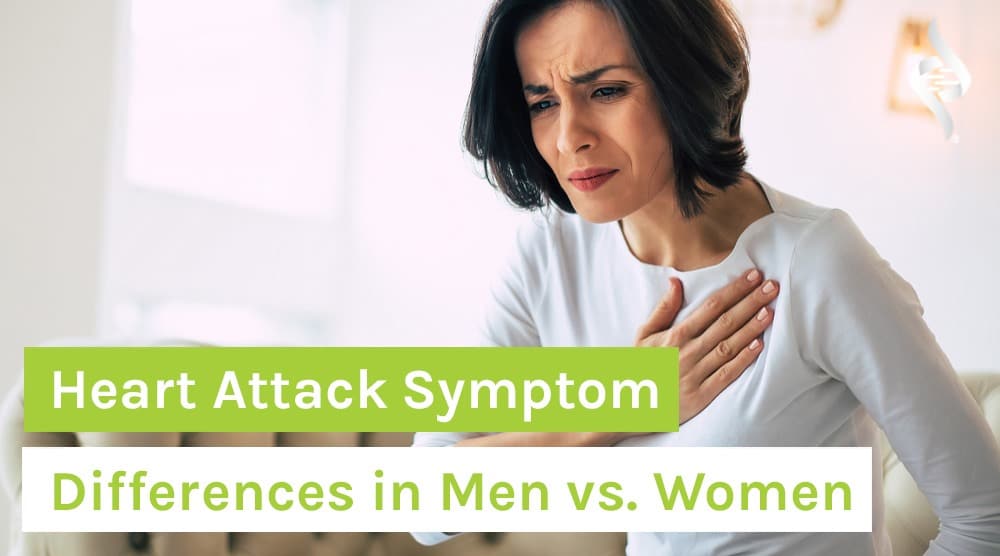Heart Attack Symptom Differences in Men vs. Women
Video Transcript:
Today, I want to share with you the differences in heart attacks in men versus women. This is really, really critical, because recognition is one of the most important key elements in your survival of a heart attack.
What we find, clinically, is there are differences in heart attacks in the sexes. Particularly, we have different biology, women versus men, and women are more likely to suffer fatalities due to heart attacks, more so than men. And so the statistics showcase we women need to be very cognizant of the assorted symptoms, and that’s what I want to share with you today. My hope is that you, your friends, and your family, utilize this expertise to potentially use it in a way that could save your life. So I want to share with you, with men, one of the things that we see just the biology of heart disease, it’s different in men than women.
Arterial Buildup vs. Microvascular Buildup
So, for instance, men tend to have more cholesterol or arterial buildup than women. Women have more microvascular buildup. And that’s the big biological difference, is that women, the microvascularity of their cholesterol and clogging situations from a more biological perspective can lead to greater instance of severity of a heart attack. And men have less inflammation than women do, so heart attacks in women tend to be more of a microvascular situation and more inflammatory in nature, and men tend to be more of the greater blockages of their arteries, the larger kind of vessels of the heart in the surrounding musculature of the heart. So let’s break down some differences.
Heart Attack Symptoms Felt by Men
Most of the time, women and men were taught the same thing about heart attack symptoms, but they are not the same in the sexes. So I want to share with you, for men watching, it is very common for you in the beginning phases of a heart attack to experience cold sweat, pain in the chest, but particularly pain in the left arm, left jaw, and left side of the neck. So it’s very left-oriented.
We will notice that with men, they register shortness of breath, and they may even have some heartburn or indigestion. And sometimes they will register a dull ache in and around the upper torso, the head, and the neck. And sometimes when they’re having the arm pain, it’s also accompanied by tingling of the arms.
Heart Attack Symptoms Felt by Women
Now women can suffer differently when they’re experiencing a heart attack. Women will have throat discomfort, dizziness, vomiting, or nausea. For women, they’ll experience a pain in between the shoulders, so the upper middle back. The pain in between the shoulder blades is intense.
They also have shortness of breath, sometimes a tightening of the chest. Particularly, women experience unexplained, extreme fatigue, and they can have sleep disturbances leading up to the heart attack. They also will notice that there is upper abdominal pressure or lower chest pressure. And anxiety is a big indicator for women. Women also who present with some of these symptoms may be told that it’s just in their head or they might be given an antidepressant.
So it’s really important for women to kind of put your stake in the ground and advocate for your health. Women need to know that we can also suffer from diseases that might showcase these common symptoms of a heart disease, like coronary spasms or cardiomyopathy. And it’s very important that if you experience any heart palpitations or tightness of your chest, regardless of your sex, do schedule an appointment with your cardiologist.
Be Proactive and See a Cardiologist
I recommend for all my patients, regardless if you have any type of heart challenges, high blood pressure, or any type of vascular impairment, doesn’t even matter if your levels are low with cholesterol and triglycerides, we all need to be very proactive in our heart health. And so make sure you take advantage of this month, February being Heart Health Awareness Month, to set up an appointment with a cardiologist. If you’re not in a cardiology practice, I think if you are over the age of 40, it is a very critical annual appointment you need to have.
Find Your Base Levels With Testing
I also recommend that you get the kind of base level scans, get an echocardiogram, get all of the diagnostics to identify where you’re at. It might even be a situation where a stress test could save your life. You won’t know it until you actually make that appointment. So I’m going to encourage all of you to be proactive. The worst scenario is for you to meet your cardiologist when you’re having a heart attack. So you have the opportunity to be proactive, support your health, get in the driver’s seat of your cardiovascular health.
And women, definitely it becomes really, really important for us to make those appointments and to pay close attention and monitor your symptoms and advocate for yourself. If a doctor says, “It’s just in your head,” fire the doctor and find somebody else who will run diagnostics to assess what’s happening.
So, I wish all of you a happy heart healthy month, and I look forward to hearing how your appointments with your new cardiologists go. And I hope many of you have awesome screenings. Thanks for tuning in and stay tuned for more information about how to prevent heart disease and how to have a healthier, happier heart.
Turmeric 3D from Organixx provides you one of the most “bioavailable” forms of turmeric due to its unique fermentation process. This means your body experiences the maximum benefits of the purest, most potent turmeric available!





Hello Firoze, We are happy to hear that you found this article informative. We definitely agree that early testing is key in prevention. Thank you for being here with us. Have an awesome weekend!